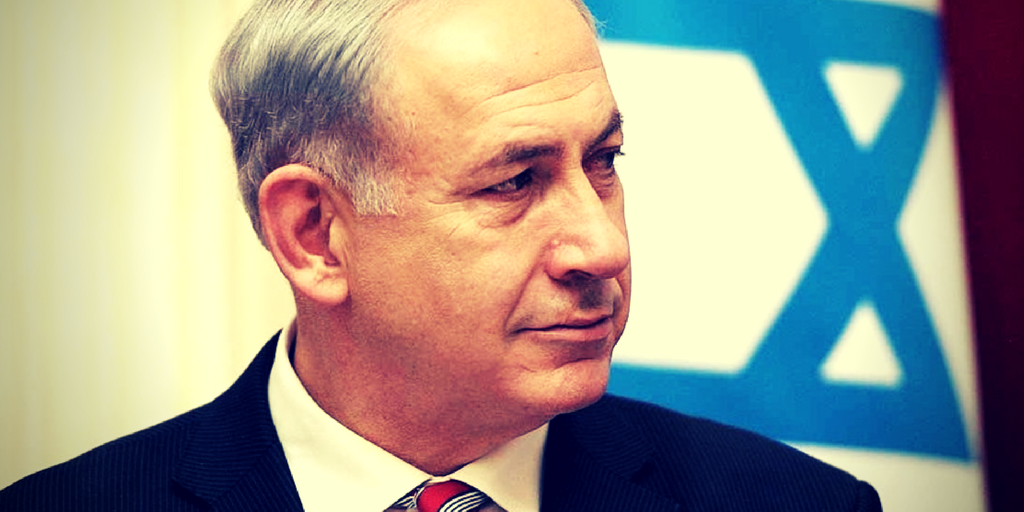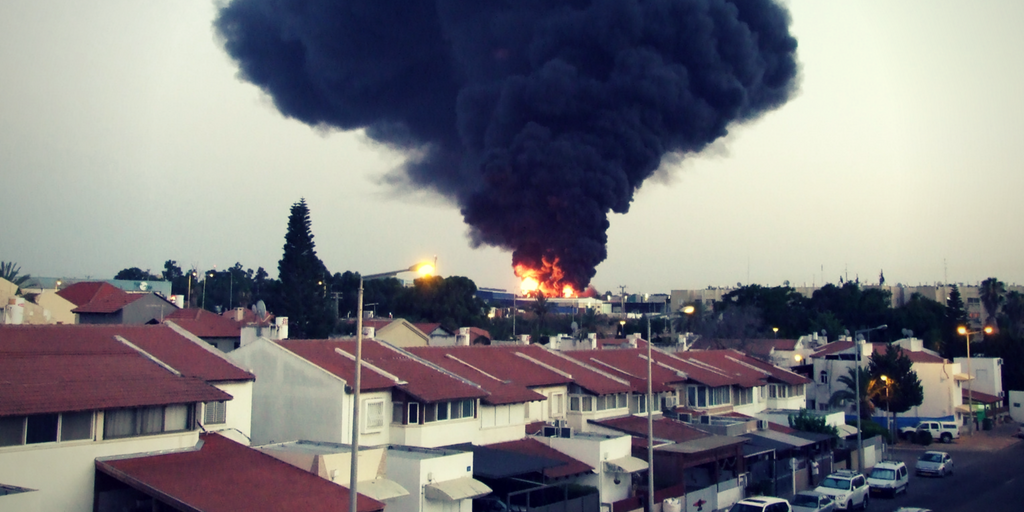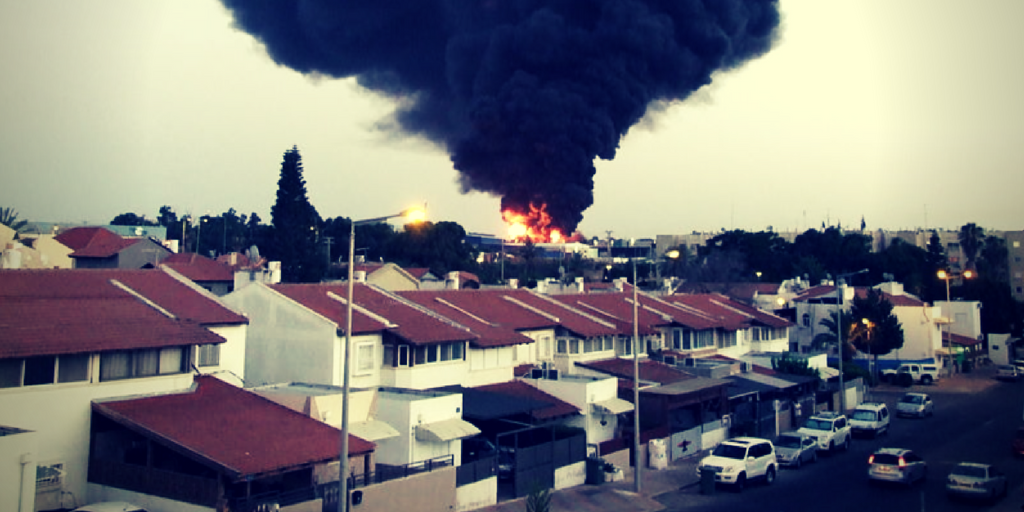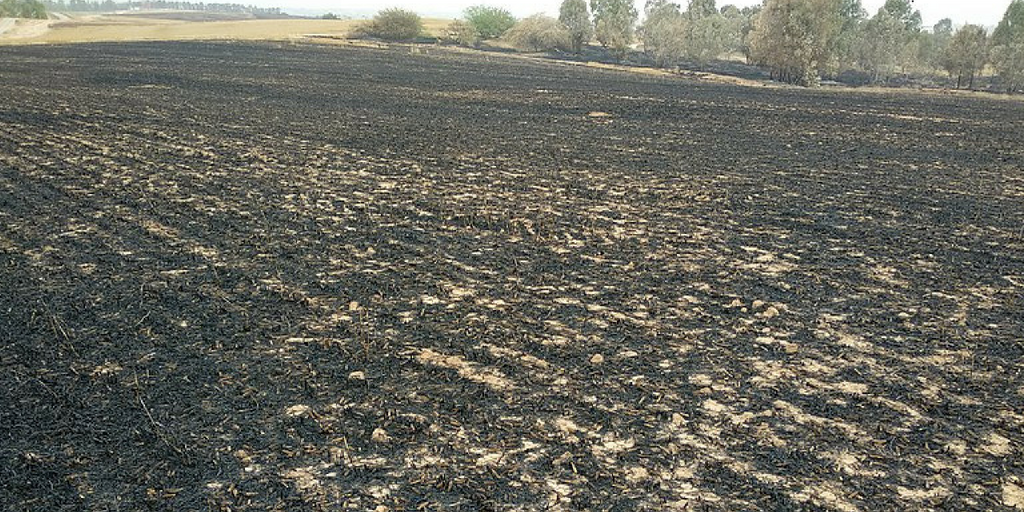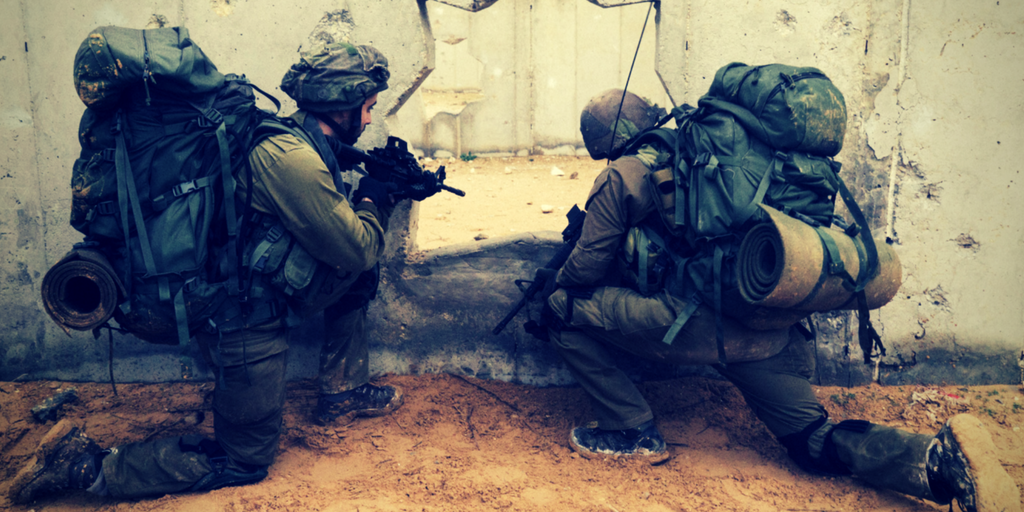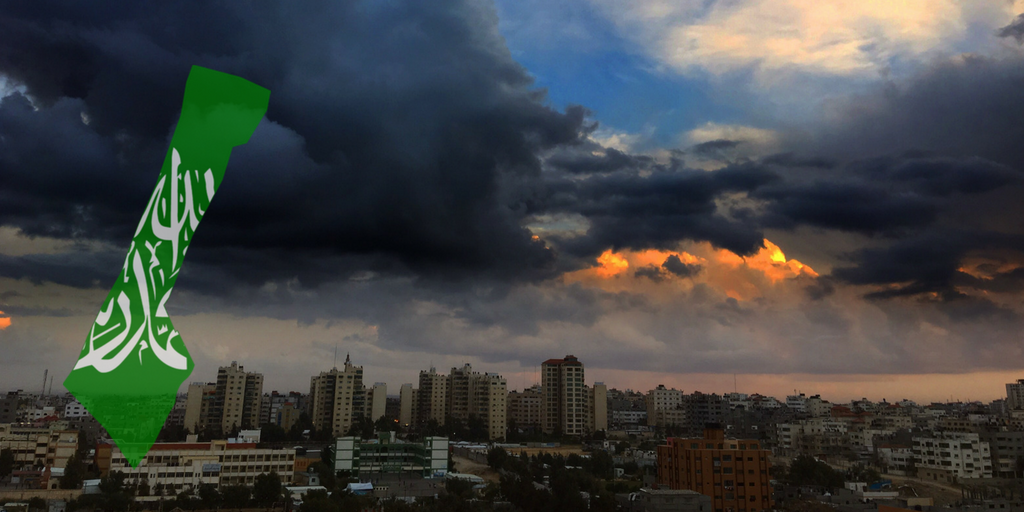Only the Creator is In Charge
PM Netanyahu Meets with Local Council Heads from the Area Adjacent to the Gaza Strip
(Communicated by the Prime Minister’s Media Adviser)
Prime Minister Benjamin Netanyahu, this morning (Monday, 16 July 2018), in Sderot, met with local council heads from the area adjacent to the Gaza Strip* and made the following remarks at the end of the meeting:
“I have just finished an excellent meeting with the heads of councils in the area adjacent to the Gaza Strip. I told them that we are in a prolonged struggle.
Just as we are now completing the blocking of the tunnels and as we took action and succeeded in stopping the mass storming of the fences, I have directed the IDF to defeat and stop the terror of incendiary kites and balloons, and we are in the midst of the process.
It is important that Hamas understand that it faces an iron wall and this wall is comprised, first of all, of a determined government, of strong local leadership and Zionist settlement, and that we will continue to strengthen it and – of course – the IDF.
We are proud of them and I am proud of the marvelous local residents who are facing difficult days. But I am convinced of our common strength to rebuff, deter and, in the end, defeat this Gaza-based terror.”
From Prime Minister Netanyahu’s answers to questions:
“I was just in a kindergarten where I saw small adorable children. We are committed to them and this is a continuous process. I do not want to tell anybody that it is over.
The day before yesterday we took very strong action against Hamas and dealt it the strongest blow it has taken since Operation Protective edge. It must be understood that whoever asks me these questions needs to be prepared for the continuation of the struggle.
There is an exchange of blows here. It is not over in one go and I cannot comfort those who have taken the most difficult losses. This is very hard to take, but we know that we are in a prolonged Zionist struggle.
For 100 years we have been fighting terror; we fight it forcefully. This place right now is the confrontation line between Islamic terrorism and the state of the Jews and we are determined to win. This entails an exchange of blows which are not yet over.”
From Prime Minister Netanyahu’s answer to a question about the kites:
“Indeed we have instructed the IDF to stop this. We do not accept, I said this yesterday as clearly as possible and it is worth their while to listen to me, especially on the other side, there is no such thing from our perspective of a ceasefire that makes an exception for incendiary kites and balloons. There is no such thing. From our point-of-view this does not exist and therefore we are in the midst of a process. I will say this for the seventh time and it will, I hope, get through. But if it will not be understood from my words, it will be understood through the actions of the IDF.”
Bibi Netanyahu: “Whoever hurts us, we will hit them with great strength.”
Bibi Netanyahu said the following at today’s Cabinet Meeting:
“Over the Sabbath we hit Hamas in a significant way and hard. Our policy is clear: Whoever hurts us, we will hit them with great strength. This is what we did yesterday. The IDF dealt Hamas the harshest blow since Operation Protective Edge. I hope that they got the message; if not, they will get it later.
I heard it being said that Israel has agreed to a ceasefire that would allow the continuation of terrorism by incendiary kites and balloons; this is incorrect. We are not prepared to accept any attacks against us and we will respond appropriately.
Yesterday I spoke with US President Donald Trump. We discussed security and diplomatic issues in light of developments in the region, with Syria and Iran first and foremost, of course.
As you know, these issues will also come up at the presidents’ summit in Helsinki. Of course I discussed them with President Putin last Wednesday. I thanked President Trump for his strong policy against Iran because since this policy has been taken, we have seen a great effect on – and inside – Iran. President Trump clearly reiterated his commitment to the security of Israel and his willingness to help the State of Israel in various fields and, of course, I thanked him for that.
Today I will be pleased to host Nick Malyshev, the Head of the OECD Regulatory Division. He has come to Israel in order to present a report on the regulatory situation in Israel. The OECD has found that Israel has achieved much in reducing regulation in recent years, thanks to the many efforts all of us here have led together. We will continue to work to cut bureaucracy for the citizens of Israel.”
Jewish Home Receives Direct Rocket Hit, IDF to Increase Intensity Against Hamas
With a missile directly hitting a house in Sderot over Shabbat, injuring the family inside, the IDF has been ordered to increase the intensity of its responses to Hamas rocket fire on southern Israel.
Prime Minister Netanyahu said the following: “In consultation with the Minister of Defense, the Chief-of-Staff and the top security command of the State of Israel, we have decided on strong action against Hamas terrorism. The IDF has struck Hamas with the hardest blow since Operation Protective Edge and we will increase the strength of our attacks as necessary.”
Hamas and Islamic Jihad has now claimed they have reached a ceasefire with Israel. With over 180 rockets fired at Israel since Friday, Israeli officials are waiting to see “facts on the ground” before ruling an intensifying of the IDF’s next moves.
PACKERS CORNER: Gaza Situation is Intolerable

Hamas Fires 45 Rockets at Jewish Communities, IDF Responds Hitting Multiple Targets
After weeks of build up by Hamas in using “protestors” to breach Israel’s security fence, some missile barrages, and flaming kites to terrorize Israeli citizens, the radical Islamic terror organization shot 45 rockets at Israel over night. Seven rockets were intercepted by the Iron Dome. While there have not be serious physical injuries, many civilians are living in fear and inside bunkers.
Rockets were aimed at schools and other civilian locations.
Hamas fired rockets at a kindergarten in southern Israel. This is not the first time it’s happened.
Dozens of children spend every day here and only luck prevented them from being injured pic.twitter.com/gdKxCQjAQ0— IDF (@IDFSpokesperson) June 20, 2018
The IDF responded, hitting multiple targets throughout the Gaza strip.
While Hamas aims rockets at Israeli civilians, the IDF strikes Hamas terror targets. This is terrorism versus defense
Read more about this morning’s events here: https://t.co/FvBnVV1xDF pic.twitter.com/d6IoIw6zpN— IDF (@IDFSpokesperson) June 20, 2018
The real question is whether this is the beginning of something larger or a one-off volley meant to apply pressure on Israel. Ultimately Hamas keep applying pressure, after all they promised to liberate “Palestine.” Any moment of laxity will enable those in the Palestinian populace that already question Hamas’ degenerative rule to gain a real foothold.
Why don’t we defend ourselves?
Originally Posted in Abu Yehuda.
Great swaths of land in the Negev desert near the Gaza strip, agricultural land and nature preserves formerly the habitats of numerous endangered plant and animal species, have been reduced to ash and smoke by Palestinian fire-kites and balloon-borne incendiary devices during the past few weeks. The entire area is blackened with the smoke from fires that are being set faster than Israeli firefighters can put them out.
Our powerful army dithers, ever pursuing its apparent goal of fighting wars without hurting anyone. Today I understand that a car belonging to one of the leaders of the bombing campaign was destroyed by an “airstrike,” probably a drone-launched missile. The car was parked and empty. That’ll teach him.
Israeli officials are afraid of the legal consequences of taking effective action against those who are launching the kites and balloons. They are afraid that they will be dragged into the International Criminal Court (even though Israel did not sign the treaty creating it and does not consider itself bound by its decisions), if the army kills any of the “civilians” that are burning our country. Those under the age of 18 are counted as “children,” and as you know one of the themes of anti-IDF propaganda is the false claim that we deliberately target children.
Purposely burning agricultural land is a war crime. Attacking from heavily populated civilian areas and employing child soldiers are war crimes. Hamas and PIJ (Palestinian Islamic Jihad) don’t care, of course. Their whole strategic plan is to take advantage of the fact that Israel considers herself bound by the laws of war, the Geneva Conventions and other treaties, while they permit themselves to do anything that will kill Jews.
They don’t do it by themselves. They have help.
Israel is always required to fight an n+1 front war, with n representing the enemies that are shooting at us, Hamas, PIJ, Hezbollah, and the rest. The additional one is the international diplomatic and legal system, led by our “friends” in the European Union.
In the past week, two Israeli communities in Judea and Samaria have been partly demolished, because homes have been found to be built on “private Palestinian land.” This means that – regardless of whether the land was considered state land when the homes were built – a Palestinian claim, sometimes not even by an individual owner, that the land was at one time used for agricultural purposes by Palestinians, has been accepted by Israel’s Supreme Court. The remedy is invariably that any structure that encroaches on such land will be demolished in toto.
Recently, the Knesset passed a law (the “Regulation Law”) that allows the state to financially compensate the Palestinian “owners” when the land was not considered private at the time the structures were built, instead of bulldozing the buildings (this can be tricky, since there usually are no records that might prove ownership in the sense familiar to those living in normal countries). This law didn’t apply in these cases, because the Supreme Court had ordered the demolitions some months ago, before the law was passed. The Court has now frozen the law awaiting its decision on various petitions against it.
Naturally, our European friends and home-grown champions of Palestinian rights were scandalized by this law. “It’s legalized land theft,” they say. This is quite an exaggeration, since the law calls for the Palestinians to be paid above-market value for the land, which they are not using and may not have used for decades (if ever). Eminent domain proceedings in the US, in which an owner can be evicted from property where he is living or using for business, are far harsher. But my guess is that despite this, when the Supreme Court rules on the petitions filed against it, they will overthrow the law.
Now you may wonder who files these petitions, the ones against the Regulation Law and the ones claiming that Israeli structures have been built on “private Palestinian land.” The answer is that there is a whole industry in Israel of “human rights” non-governmental organizations that employs a battery of expensive and dedicated lawyers to fight the State of Israel. Thanks to Israel’s extraordinary system in which any citizen may petition the Supreme Court on almost any matter, regardless of whether he or she is affected by it, left-wing groups like Peace Now, Yesh Din, and others can and do involve themselves in these matters.
But who supports the organizations, pays their staffs and their lawyers? Probably no more than a few percent of Israelis support what most see as their extremist ideology. And yet left-wing NGOs are everywhere, filming and trying to provoke IDF soldiers doing their duty, finding Palestinians who will testify that their grandfathers worked the land on such-and-such a hill where today an Israeli settlement stands, and filing petition after petition in the Israeli courts, particularly the Supreme Court.
The money does not come from Israel. It doesn’t even come from the Palestinians, whose leaders are happy to skim millions from the aid they get from the US and Europe, primarily to live well or put into their Swiss bank accounts. It comes, unsurprisingly, mostly from European governments, where millions of Euros are funneled into organizations like Peace Now, Yesh Din, B’tselem, Physicians for Human Rights – Israel, Breaking the Silence, Adalah, and many others. Somewhat less important donors include the American New Israel Fund and Rockefeller Brothers Fund.
These foreign-funded NGOs are active in the Israeli and international legal arenas, as well as the international propaganda campaign to demonize and delegitimize the State of Israel. Some explicitly support BDS, despite the official positions of their donors. For example, several of them recently sent a letter to the American Secretary of State calling for an arms embargo against Israel because of its actions to defend its border.
Today the NGO Monitor organization, which keeps track of anti-Israel NGOs and their funding, released a report showing that the European Union has given large grants (hundreds of thousands of Euros) to several NGOs to press war crimes accusations against IDF officers and soldiers and other Israeli officials in foreign courts. This sort of thing may in part explain the timidity of the IDF to take effective action against the arsonists of Gaza.
While our Arab and Iranian enemies have had little success in damaging our Jewish state with wars and terrorism, our European ones have succeeded with their Euros to roll back settlement activities in Judea/Samaria, resulting in the expulsion of Jews from their homes. They have fought tooth and nail against our government’s efforts to deport illegal migrants, whom it rightly considers a demographic and social threat. They have hamstrung the IDF’s response to arson terrorism from Gaza, and turned the main concern of the IDF from defeating our enemies to avoiding legal entanglements.
The message this sends to the terrorists of Hamas, the PLO, and the PIJ is simple: you have a green light – the Jews are too weak to fight back.
There are solutions to these problems. Two years ago, the Knesset passed a relatively weak transparency law requiring some NGOs to report contributions from foreign governments. It needs to be strengthened – in fact, there is no reason for Israel to permit foreign governments to intervene in our domestic affairs at all. Opponents will tell you, precisely inverting the truth, that limiting the influence of foreign-funded NGOs is “anti-democratic,” as if democracy requires subverting the will of Israeli voters! But there is only one reason that such legislation is opposed in the Knesset, and that is because some members are themselves treasonously sucking at the European teat. That has to stop.
The Supreme Court has far too much power and zero accountability. No other democratic country has such a situation. The balance of power between the branches of government must be restored.
The other necessary change is a change of attitude. The more Israel refrains from self-defense because of fear of the legal consequences, the more she will be threatened with such consequences. The cycle must be broken, both because it prevents us from acting and because it broadcasts weakness to our enemies. The arson kites need to be met with deadly force, not endless debate. Jewish residents of the territories should have at least equal rights as Arabs, and not be evicted from their homes as a result of legal catch-22s. Illegal migrants should be deported (see here and here).
The legal and diplomatic decks are stacked against us today, partly because of our own actions. We need to get over it and defend ourselves. Nobody else will.
The IDF & Gaza: Soldiers or Sociologists?
Has the IDF brass forgotten that they are soldiers, charged with providing military solutions to physical threats to the nation’s security; not sociologists, tasked with diagnosing the societal ailments of its enemies?
…the IDF General Staff has been insisting there is only one thing Israel can do about Gaza. According to our generals, Israel needs to shower Hamas with stuff. Food, medicine, water, electricity, medical supplies, concrete, cold hard cash, whatever Hamas needs, Israel should just hand it over in the name of humanitarian assistance. Every single time reporters ask the generals what Israel can do to end Hamas’s jihadist campaign, they give the same answer. Let’s shower them with stuff. – Caroline B. Glick, Who Leads Israel? June 1, 2018.
Israel’s security establishment continues to look for solutions to the situation in the Gaza Strip, as security sources on Monday warned about an approaching complete economic collapse in the Gaza Strip…Those sources pointed out that preventing a humanitarian disaster in Gaza is an urgent matter of national security for Israel. – David Isaacs, Israeli Defense Establishment Warns of Complete Economic Collapse in Gaza, Jewish Press, June 11, 2018.
We are still faced with the absolutely crucial problem of making the intellectual and imaginative effort not to project our ideas of common sense or natural motivation onto the products of totally different cultures… [People] assume that the light of their own parochial common sense is enough. And they frame policies based on illusions. Yet how profound is this difference between political psychologies and between the motivations of different political traditions, and how deep-set and persistent these attitudes are. – Robert Conquest, Reflections on a Ravaged Century, 1999.
Earlier this week, the Israeli security cabinet convened to discuss the humanitarian situation in the Gaza Strip. Thankfully, the meeting, which took place against the backdrop of the ongoing violence on the border with Gaza, did not produce any operational decision or any undertaking on the part of Israel to attempt to alleviate the situation in Gaza.
A recipe to enrich Hamas
However, the very fact that a security cabinet meeting took place at all to discuss how improving the humanitarian situation in Gaza could somehow contribute towards easing the security situation, is in itself disturbing and disappointing.
For the connotation that this clearly conveys is that (a) the violence is a result of the dire socio-economic conditions in Gaza, rather than obdurate Arab refusal to accept any semblance of Jewish political independence in any portion of the Biblical Land of Israel, regardless of its geographical contours; and (b) Israel bears responsibility for these dire conditions and hence, for the violence that they allegedly precipitate. Thus, according to this “logic”, it is incumbent on Israel to find ways to alleviate the socio-economic distress in Gaza as a form of “enlightened self-interest” to reduce the threats to its security.
This, of course, is an utter distortion of reality and, as I have been at pains to argue in my last two columns (see here and here), reflects a total inversion of causality. For it is demonstrably incontrovertible that the privation in Gaza is the result of, not the reason for, the incandescent hatred of the Jewish state. Indeed, any enhancement of the humanitarian effort will inevitably empower, enrich and entrench Hamas, which, invariably, will either physically expropriate much of any influx of goods, or impose taxation on them—and replenish its coffers to finance its nefarious activities.
Beyond the IDF’s professional purview
Arguably, one of the most disconcerting elements of the security cabinet meeting was that it seems to have been convened under pressure from senior IDF officers, who consider that a collapse of civilian infrastructures in Gaza was imminent, and such collapse would precipitate a severe security predicament for Israel.
This, in many ways, is an inappropriate overreach by the IDF, well beyond its professional purview.
For, although the IDF has admirably shouldered numerous domestic social tasks, which are usually beyond the range of duties other armed forces take upon themselves—such as providing educational frameworks for disadvantaged youth—it is nevertheless not a social welfare organization—especially when such welfare concerns hostile aliens rather than Israeli citizens.
Indeed, as the national defense force, its overriding responsibility is to deter external enemies from attacking Israel, or if such deterrence fails, to defeat them—preferably by preempting such attacks, or by decisively repulsing them.
But, it is one thing to deter one’s enemy from attacking because they fear the consequences of the response that attack will precipitate. It is quite another to cajole them into delaying attack, by offering benefits—especially if the delay is exploited by them to rearm, redeploy and regroup, only to initiate future aggression with enhanced capabilities at some later time of their choosing.
Tactical genius, strategic myopia
As someone who served for several years in operational capacities in the Israel security establishment, I have great respect for the ingenuity, dedication and sacrifice of the men and women who serve in it.
Moreover, the IDF and Israel’s other security services have shown extraordinary prowess in their ability to obtain detailed operational intelligence on the country’s adversaries, and to deal swiftly with specific targets.
Accordingly, it is no easy task for me to level criticism at those for whom I have a sense of genuine regard and natural comradeship. However, it is becoming increasing apparent that the Israeli security establishment is seemingly incapable of translating its indisputable and undisputed technical/tactical genius into clear and coherent strategic wisdom.
Of course, while it is true that national power is more than mere military might, the IDF is increasingly straying into realms which are outside its field of professional expertise and should be beyond its legitimate intervention.
Thus, as I lamented in my last column, in recent years—perhaps due to the professors and political credos they are exposed to during their academic studies—it appears that many in the senior echelons of Israel’s security establishment have forgotten that they are soldiers, charged with providing military solutions to physical threats to the nation’s security and not sociologists, tasked with diagnosing the societal ailments of its sworn enemies.
Both inappropriate and invalid
Indeed, not only are the IDF forays into the realm of sociology formally inappropriate, they are also substantively invalid.
After all, the grim state of affairs is not the result of any scarcity of international funding or Israeli largesse. In past years, Gaza has had an abundance of both –and has squandered them both, because—as a collective—its communal aspiration is not greater prosperity and material well-being for its individual inhabitants, but the physical annihilation of what is perceived as an enemy collective—the Jewish nation-state.
No amount of humanitarian aid can address this aspiration. Quite the reverse! Increasing it will only increase the drive to fulfil it.
It is beyond distressing that the senior echelons of the IDF seem oblivious of this. For it is a blatant violation of Robert Conquest’s caveat (see introductory excerpt) “not to project our ideas of common sense or natural motivation onto the products of totally different cultures.”
Indeed, it is to ignore “how profound is th[e] difference between political psychologies and between the motivations of different political traditions, and how deep-set and persistent these attitudes are.”
Of course, if one surveys the history of the last half-century, there does appear to be one way—and only one way—to alleviate the humanitarian crisis in Gaza. But it is hardly one that the IDF is likely to endorse.
For, alas, it entails…reinstating the “Occupation”.
Occupation as a humanitarian remedy??
After all, under Israeli occupation, societal conditions in the “West Bank”/Gaza soared beyond all recognition—only to plunge once it ended.
Last week, I urged readers to familiarize with themselves with an article, “What Occupation?”, by Prof. Efraim Karsh, formerly of King’s College, London, now director of the Begin-Sadat Center for Strategic Studies. It provides staggering statistics on the meteoric socio-economic development of the Palestinian-Arabs under Israeli administration.
It should be compulsory reading, not only for Israeli politicians, but for the senior echelons of the IDF. The following is a brutally condensed summary:
Karsh writes: “At the inception of the occupation, conditions in the territories were quite dire. Life expectancy was low; malnutrition, infectious diseases, and child mortality were rife; and the level of education was very poor. Prior to the 1967 war, fewer than 60 percent of all male adults had been employed, with unemployment among refugees running as high as 83 percent.”
He points out: “Within a brief period after the war, Israeli occupation had led to dramatic improvements in general well-being, placing the population of the territories ahead of most of their Arab neighbors.”
The improvement in employment was dramatic: “the number of Palestinians working in Israel rose from zero in 1967 to … 109,000 by 1986, accounting for 35 percent of the employed population of the West Bank and 45 percent in Gaza. Close to 2,000 industrial plants, employing almost half of the work force, were established in the territories under Israeli rule.”
Astonishingly: “During the 1970’s, the West Bank and Gaza constituted the fourth fastest-growing economy in the world—ahead of such “wonders” as Singapore, Hong Kong, and Korea…with per-capita GNP expanding tenfold between 1968 and 1991 from $165 to $1,715 (compared with Jordan’s $1,050, Egypt’s $600…).
Occupation as a humanitarian remedy?? (cont.)
Under Israeli “Occupation”, the Palestinians-Arabs made vast progress in social welfare: “… mortality rates in the West Bank and Gaza fell by more than two-thirds between 1970 and 1990, while life expectancy rose from 48 years in 1967 to 72 in 2000 (compared with an average of 68 years for all the countries of the Middle East and North Africa). Israeli medical programs reduced the infant-mortality rate of 60 per 1,000 live births in 1968 to 15 per 1,000 in 2000…
No less remarkable were advances in the Palestinians’ standard of living: “By 1986, 92.8 percent of the population in the West Bank and Gaza had electricity around the clock, as compared to 20.5 percent in 1967; 85 percent had running water in dwellings, as compared to 16 percent in 1967…. Illiteracy rates dropped to 14 percent of adults over age 15, compared with 69 percent in Morocco, 61 percent in Egypt, 45 percent in Tunisia, and 44 percent in Syria.”
Karsh is not alone in assessing the contribution of Israeli administration to Palestinian development and welfare. In his Rivers of Eden, (Oxford University Press), Daniel Hillel, a scholar largely sympathetic to the Palestinian cause, noted that in agriculture the pattern was similar: “The Israeli occupation changed local agriculture profoundly. It introduced modern technology, including mechanization, precision tillage, pest control… It also introduced efficient methods of irrigation…especially drip irrigation. Consequently, output increased greatly, and farming was transformed from a subsistence enterprise to a commercial industry.”
Sadly, after 1993, when Israel relinquished control of Gaza to Arafat and his cronies, the socio-economic conditions deteriorated precipitously—until today we seem be perennially on the cusp of a humanitarian catastrophe.
Carpe diem: Humanitarian crisis as an opportunity
Clearly then, as the last quarter-century shows, the Palestinian-Arabs have unequivocally demonstrated that they have failed the test of history, utterly unable to establish a viable self-governing entity. Moreover, since the IDF would certainly balk at the prospect of re-instating the “Occupation”—especially if it is indeterminate and open-ended, while we wait for Palestinian-Arabs to morph into something they have not been for the last century and show no sign of doing so in any foreseeable future, there is only one other alternative to alleviate the humanitarian crisis.
This is to fund the permanent relocation/rehabilitation of non-belligerent Palestinian-Arab individuals to third party countries, “outside the circle of violence” and free of the clutches of the cruel corrupt cliques who have led them into disaster after disaster for decades.
In this regard, the current humanitarian crisis is an opportunity—and should be recognized as such.
The time has come for Israel to seize the moment. Carpe diem!
The “Humanitarian” Hoax
The privation in Gaza is not the cause of the enmity towards the Jewish state. Quite the opposite! It is the enmity towards the Jewish state that is the cause of the privation in Gaza.
No cliché has dominated the discourse on the Gaza situation more than the perception of Palestinian violence as a corollary of the Strip’s dire economic condition – Prof. Efraim Karsh, It’s Not Gaza’s Economy, Stupid, June 3, 2018.
Many experts claim that an easing of economic conditions in Gaza…is the way to achieve political stability in a Gaza Strip ruled by Hamas. This is a fallacious argument. Prof. Hillel Frisch, Economic Benefits Will Not Bring Stability to Gaza , June 6, 2018.
It is refreshing to see what appears to be an emerging challenge to the mindless Pavlovian response, propagated by most of the Israeli media, to the horrific hatred and violence on display along the border with Gaza.
Soldiers turned sociologists?
Sadly, and perhaps, most disturbingly, it is none other than the IDF and the security establishment that appear to be one of its principal advocates.
Reflecting this hopelessly unfounded perspective was a recent report, headlined, “Israeli military recommends easing humanitarian situation in Gaza”, which cited a senior military source advising that “Israel should ease the humanitarian situation in Gaza and reach a long term ‘arrangement’ with Hamas”. A day later, this was followed by a similar report,” Army calls to lift some economic restrictions on Gaza, boost chances of quiet”, citing “A top official in the IDF’s Southern Command [who stated that ] Israel must take steps to ease the humanitarian crisis in Gaza, which would likely bring quiet to the Gaza region.”
The latter item provoked a brusque response from an exasperated talk-backer: “Sometimes I wonder if there are any sane people left in the top people. All Gaza wants [is] Jews dead and off the land and yet the army wants to give them the tools to do it…!”
Indeed, in recent years—perhaps due to the professors and political credos they are exposed to during their academic studies—it appears that many in the senior echelons of Israel’s security establishment have forgotten that they are soldiers, charged with providing military solutions to physical threats to the nation’s security and not sociologists, tasked with diagnosing the societal ailments of its sworn enemies.
Misleading malicious mantra
Perturbingly, the recommendations to reach an agreement with Hamas to alleviate the humanitarian conditions blithely ignore that Gazans did everything in their power to exacerbate them—repeatedly vandalizing and setting fire to the Kerem Shalom crossing, which provides vital gas and fuel and humanitarian supplies to the Strip. Indeed, during the ongoing events on the border, Hamas explicitly refused to accept humanitarian supplies donated by Israel, including medical equipment such as fluids, bandages, equipment for treating children and disinfectants.
Accordingly, to attribute the incandescent hostility toward Israel in Gaza to the dire humanitarian situation plays directly into the hands of Israel’s detractors. Indeed, as I have pointed out elsewhere it is, in effect, to be complicit with the enemy—endorsing its mendacious and malevolent narrative.
For it necessarily implies that, if only Israel would somehow initiate/facilitate an improvement in Gaza’s living conditions, the violence would subside. This not only reinforces the false claims that Palestinian terrorism is driven by Israeli-induced economic privation, but also that Israel bears the responsibility for such terror, which is, therefore, no more than an understandable reaction to hardship and despair, externally imposed by a cruel, alien “oppressor”.
This, of course, is not only to distort—but to invert—the realities on the ground.
Conventional wisdom and the inversion of causality
Last week I wrote: “… the penury in Gaza is not the cause of Arab enmity towards the Jewish state. Quite the opposite! It is Arab enmity towards the Jewish state that is the cause of penury in Gaza.”
Accordingly, I was gratified to see my diagnosis echoed this week, by Prof. Efraim Karsh, who categorically affirmed this inversion of causality that afflicts conventional wisdom “…it is not Gaza’s economic malaise that has precipitated Palestinian violence; rather, it is the endemic violence that has caused the Strip’s humanitarian crisis.”
Karsh, formerly of King’s College London, now director of the Begin-Sadat Center for Strategic Studies (BESA) is, to my mind, one of the most astute scholars of the Israel-Palestinian conflict.
In the past, he has torn to shreds the defamatory accusations regarding Israel’s alleged mistreatment of the Palestinian-Arabs during its pre-Oslo administration of Judea-Samaria. Indeed, he has meticulously shown how the socio-economic conditions of the Palestinian-Arabs soared beyond recognition during that period, outstripping those in many “unoccupied” countries in the Muslim/Arab world—only to disastrously deteriorate once control was relinquished to Arafat and his cronies. Elsewhere, he has excoriated the frightful follies and foreseeable failures of the ill-fated and ill-conceived Oslo Accords—and I would urge readers to familiarize themselves with his incisive insights on these matters.
“No causal relationship between economic hardship & mass violence”
In his piece this week, Karsh recalls that: “At the time of the September 1993 signing of the Israel-PLO Declaration of Principles, conditions in the territories were far better than in most Arab states…But within six months of Arafat’s arrival in Gaza (in July 1994), the standard of living in the Strip fell by 25%, and more than half of the area’s residents claimed to have been happier under Israel.”
Significantly, he notes: “…. at the time Arafat launched his war of terrorism in September 2000, Palestinian income per capita was nearly double Syria’s, more than four times Yemen’s, and 10% higher than Jordan’s – one of the better-off Arab states. Only the oil rich Gulf states and Lebanon were more affluent.”
With regard to Gaza, Karsh underscores: “…countless nations and groups in today’s world endure far harsher socioeconomic or political conditions than the Palestinians, yet none have embraced violence and terrorism against their neighbors with such alacrity and on such a massive scale.”
He aptly points out “…, there is no causal relationship between economic hardship and mass violence. On the contrary, in the modern world it is not the poor and the oppressed who have carried out the worst acts of terrorism and violence but, rather, the militant vanguards from among the better educated and more moneyed circles of society.”
So, as Karsh reiterates: “…it is not socioeconomic despair but the total rejection of Israel’s right to exist…which underlies the relentless anti-Israel violence emanating from these territories and its attendant economic stagnation and decline.”
Couldn’t put it better myself!
Right diagnosis, wrong remedy?
But it is not just that economic aid to redress Gaza’s humanitarian predicament would be ineffective. Worse, it would be counterproductive. For as Karsh’s BESA colleague, Prof. Hillel Frisch points out: “Economic largesse at this point would only augment Hamas’s resources, as it taxes incoming goods and aid. That money will be funneled back to its hard core through campaigns such as the March of Return.”
Accordingly, given the fact that Hamas would undoubtedly expropriate much of any incoming aid for its own nefarious needs, it stands to reason that persisting with such aid will only sustain its ability to continue its offensive action against Israel—thus sustaining the conflict and prolonging the suffering of the population.
This, of course, raises the trenchant question of what should be done.
It is here that I diverge from both Karsh and Frisch in my reading of what is called for to redress the problem. For while I largely concur with their diagnosis of the malaise, I have grave reservations as to their respective prescriptions of how to remedy it.
For in essence, both invoke comparisons with the defeat of Germany and/or Japan in World War II and the ability of the victorious Allies to remold formerly aggressive totalitarian countries into peaceable democracies.
Right diagnosis, wrong remedy? (cont.)
Thus, Frisch refers to “the total defeat of Nazi Germany, and its subsequent occupation and division by the winning coalition, [which] meant that the US and its allies could mold West Germany to their liking through denazification and democratic rule”.
In similar vein, Karsh writes: “Just as the creation of free and democratic societies in Germany and Japan after World War II necessitated a comprehensive sociopolitical and educational transformation, so, too, it is only when the local population sweeps its oppressive rulers from power, eradicates the endemic violence from political and social life, and teaches the virtues of coexistence with Israel that Gaza can look forward to a better future.”
Regrettably, both these learned scholars overlook one crucial element when it comes to dealing with—i.e. defeating—a recalcitrant adversary in the Muslim world today, which largely undermines the validity of any analogy with the fortunate outcomes and the defeat of tyranny in World War II. Indeed, it is one the US overlooked when it embarked on its “War on Terror” in Iraq and Afghanistan after 9/11.
Indeed, quite apart from the fact that to implement both Frisch’s and Karsh’s proposal, Israel would presumably have to retake and hold Gaza for an indeterminate period of time—to enable it to remold Gazan society and implement the required “comprehensive sociopolitical and educational transformation”, there are important differences in the geo-political structure of the situation prevailing in post-WWII Japan and Germany, on the one hand, and those facing Israel today vis-a-vis the Palestinian-Arabs, on the other.
These would gravely undermine the ability of any attempt to remold or transform Palestinian-Arab society in general, and Gazan society in particular.
Unlike Germany and Japan…
For unlike any prospective self-governing Palestinian entity, which sees itself unequivocally bound culturally, ethnically and religiously to the larger Islamic world, Germany was not surrounded by a swathe of kindred Teutonic nations—nor Japan by kindred Nipponic nations—which, driven by a radical Teutonic/Nipponic ideology, strove continually to undermine the stability and legitimacy of any peaceable regime that foreign powers might install.
This, however, was the case in both Iraq and Afghanistan—and is certainly likely to be the case for any self-governing Palestinian entity ,whether in Judea- Samaria or in Gaza.
Unlike defeated Berlin (and Tokyo), Baghdad (and Kabul) along with their environs, were continually assailed by Islamic insurgents, financed, armed and equipped from surrounding Muslim countries, to undermine any arrangement or undercut any resolution the victorious powers wished to implement and imperiling any government, not to their liking.
Clearly, this is very likely to be the case in the Israeli/Palestinian situation, with regional Muslim-majority countries constituting a virtually unending source of post-victory instability and incitement. Accordingly, because any attempted remolding or “sociopolitical and educational transformation” is likely to be impeded—even up-ended—by external sources of incitement and agitation, the only way Israel can ensure that Gaza (or Judea-Samaria) will not be taken over by some inimical radical regime is to govern these areas by itself.
But the only way Israel can govern these territories itself, without the need to rule over a recalcitrant alien ethnic group, is to remove that ethnic group from those territories.
What could be simpler or more self-evident??
The real humanitarian solution to Gaza’s humanitarian crisis
Clearly then, persisting with the current format of humanitarian effort will only exacerbate the humanitarian crisis. Accordingly, this effort must be restructured and redirected.
Indeed, the only durable humanitarian solution that can ensure Israeli security and relieve Israel from the burden of “ruling over another people”, is to generously finance the relocation/rehabilitation of the non-belligerent Gazan population to third party countries, and allow them to build more prosperous and more secure lives, outside the “circle of violence”, to which they will inevitably be subject, if they remain where they are—no matter what the level of humanitarian aid.
All we need now is leadership with sufficient political will, intellectual daring, and ideological commitment to undertake what must be undertaken.
Why would that be a problem??


